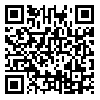Volume 9, Issue 4 (2-2024)
فصلنامه تحقیقات بنیادین علوم انسانی 2024, 9(4): 135-170 |
Back to browse issues page
Download citation:
BibTeX | RIS | EndNote | Medlars | ProCite | Reference Manager | RefWorks
Send citation to:



BibTeX | RIS | EndNote | Medlars | ProCite | Reference Manager | RefWorks
Send citation to:
Rafiei Atani A. The Conceptual Model of the Conventional Economic Man. فصلنامه تحقیقات بنیادین علوم انسانی 2024; 9 (4) :135-170
URL: http://frh.sccsr.ac.ir/article-1-612-en.html
URL: http://frh.sccsr.ac.ir/article-1-612-en.html
Abstract: (1269 Views)
This paper aims to conceptualize the conventional notion of the "economic man"—the central subject of contemporary economics—within a model based on four fundamental relationships that shape human identity and existence: the individual's relationship with God, nature, society, and the self. According to this framework, the modern Western human, from the 14th century onward, has gradually transformed into the "economic man." Accordingly, the Western individual—i.e., the economic man—has constructed his identity and existence around humanism as a foundational concept, realized respectively through deism, naturalism, individualism, and hedonism/utilitarianism, each corresponding precisely to the four aforementioned relationships. Furthermore, the core assumptions of neoclassical economics are formulated within the framework of rational choice theory. Competing approaches to conventional economics, including Islamic economics, can also be positioned within this conceptual model by offering alternative interpretations of these relationships.
Keywords: Homo Economicus, Rational Choice Theory, Assumptions of Neoclassical Economics, Individualism, Utilitarianism, Perfect Rationality.
Send email to the article author
| Rights and permissions | |
 |
This work is licensed under a Creative Commons Attribution-NonCommercial 4.0 International License. |






